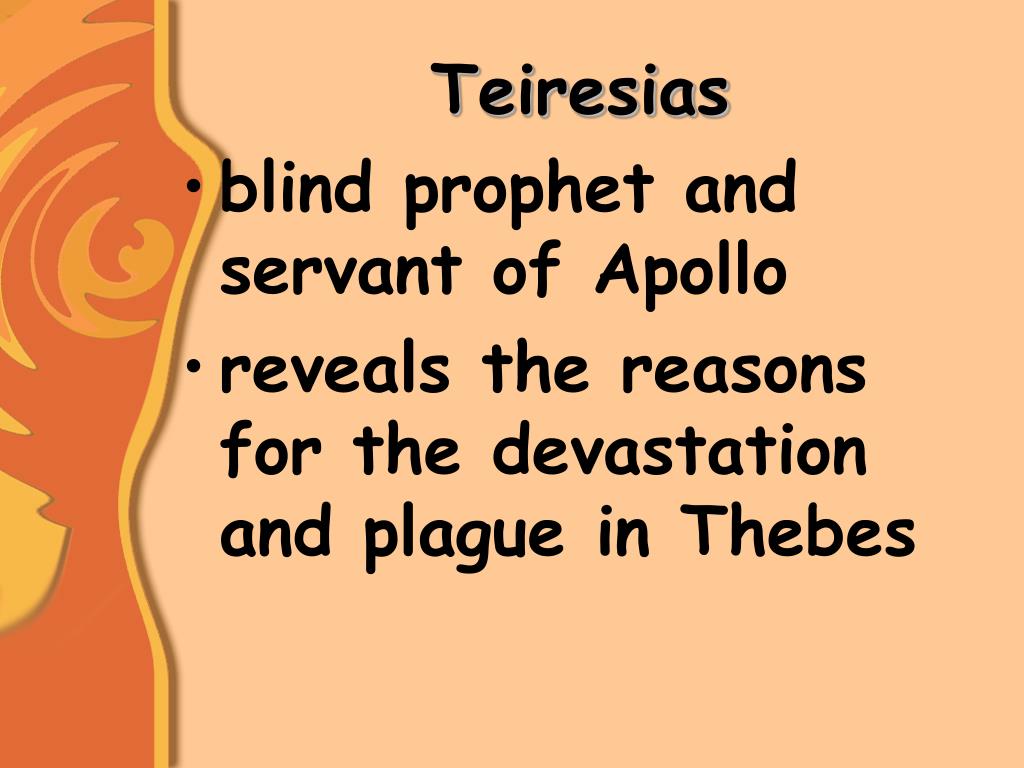

Since Teiresias and Oedipus are the only two characters involved, Sophocles basically forces the audience to side with Teiresias, against the belligerent Oedipus. Playwrights routinely use fools to reveal the truth to the audience, in settings where the other characters do not take them seriously. Even though Teiresias is a prophet with authority, Oedipus makes him a fool by disregarding his input. Once he finally realizes what he has done, Oedipus curses himself, saying “Against those two I have committed acts / so vile that even if I hanged myself / that would not be sufficient punishment” (Line 1620-3). This ultimately causes Oedipus’s downfall. Although Teiresias warns Oedipus, very bluntly as well as using innuendo, that it was in fact Oedipus who killed King Laius, Oedipus still refuses to believe him. Sophocles notifies the audience that Oedipus’ fate lies in Teiresias’ words. During this conversation, Sophocles’ language continually hints at Oedipus’ sight or accuracy: “you do not see” (Line 336 ), “you chide me instead” (Line 337), “you are the land’s pollution” (Line 352 ), “even your own words miss the mark” (Line 325 ).

Oedipus responds vehemently and even goes so far as to call him a traitor to the city of Thebes, one of the most capital insults in the ancient world. Why is it you question me and waste your labor? I will tell you nothing” (Line 335). Following this, Teiresias does not think this is a good idea: “I will not bring this pain upon us both, neither you nor on myself. He is blinded by his own pride, by his own opinions, and doesn’t listen to the man who is right, because he is merely physically blind. Oedipus represents an important aspect of humanity: pride. Oedipus is so caught up in his self-perceived omniscience he is that he is not even willing to consider that he is in the wrong, ever. This not only reflects on Oedipus’ willful blindness, but also, through this scene, Sophocles suggests that it is human nature to refuse bad news, knowledge of shortcomings and self-assessment. He doesn’t listen, and continues to pressure Teiresias to confess his prophecy. However, Oedipus is deaf, or rather, blind, to what Teiresias has to say. This means that Teiresias knows something about the prophecy but doesn’t want to say anything for the betterment of the two of them. It will be easiest for us both” (Line 320). In fact he even requests “let me go home. He continues to speak about how if Oedipus knew the truth he would flee the city of Thebes. Teiresias does not respond immediately with the answer, rather, he talks around the answer to mock Oedipus for his inability to see the obvious. In this conversation, Oedipus asks the prophet who killed King Laius. In this scene, Oedipus converses with the prophet Teiresias.

This is the most important scene of the play. Teiresais only appears in Sophocles’ “Oedipus Rex” for one scene. He is similar to the oracle in Oedipus Rex, Teiresias, who has authority and is wise, yet Oedipus does not take him seriously because of his damaging information as well as his impaired sight.

The fool in King Lear has no credibility that anyone responds to, although is much more wise than King Lear in the play. Whether the blindness is literal, like Teiresias in Sophocles’ Teiresais in “Oedipus Rex,” or blindness as transparency, like the Fool in Shakespeare’s’ King Lear, both of these tragedies contain a persona of a fool, someone whom people think cannot see at all, or cannot see things clearly. People often mistake blind people, or people labeled as somehow flawed, for being ignorant. “How terrible is wisdom when it brings no profit to the man that’s wise” (Sophocles, line 316, “Oedipus Rex”).


 0 kommentar(er)
0 kommentar(er)
